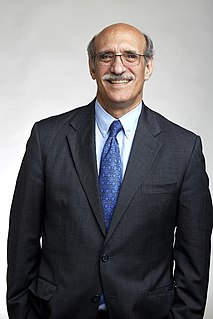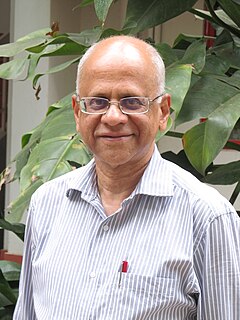Related Research Articles

Michael Evan Mann is an American climatologist and geophysicist, currently director of the Earth System Science Center at Pennsylvania State University, who has contributed to the scientific understanding of historic climate change based on the temperature record of the past thousand years. He has pioneered techniques to find patterns in past climate change, and to isolate climate signals from noisy data.

Jacob Koppel Javits was an American politician who represented New York in both houses of Congress.

Vikram Ambalal Sarabhai was an Indian physicist and astronomer who initiated space research and helped develop nuclear power in India. He was honoured with Padma Bhushan in 1966 and the Padma Vibhushan (posthumously) in 1972. He is internationally regarded as the Father of the Indian Space Program.

Anthony Stephen Fauci is an American physician and immunologist who has served as the director of the National Institute of Allergy and Infectious Diseases (NIAID) since 1984. Since January 2020, he has been one of the lead members of the Trump administration's White House Coronavirus Task Force addressing the COVID-19 pandemic in the United States. Fauci is one of the world's leading experts on infectious diseases, and during the early stages of the pandemic The New Yorker and The New York Times described Fauci as one of the most trusted medical figures in the United States.
Paul Alivisatos is an American scientist of Greek descent who has been hailed as a pioneer in nanomaterials development, and is an internationally recognized authority on the fabrication of nanocrystals and their use in biomedical and renewable energy applications. He is ranked fifth among the world's 100 top chemists in the list released by Thomson Reuters. In 2009, he was named the Director of the Lawrence Berkeley National Laboratory and in 2014 he was named a laureate for the National Medal of Science. In 2016 he was named U.C. Berkeley's Vice Chancellor for Research. As of July 1, 2017, he is University of California, Berkeley's Executive Vice Chancellor and Provost, and will continue on as Vice Chancellor for Research on an interim basis.

Clifford Seth Stein, a computer scientist, is a professor of industrial engineering and operations research at Columbia University in New York, NY, where he also holds an appointment in the Department of Computer Science. Stein is chair of the Industrial Engineering and Operations Research Department at Columbia University. Prior to joining Columbia, Stein was a professor at Dartmouth College in New Hampshire.

Jaap Goudsmit is Dutch scientist, known for his research in the field of AIDS and influenza. He shifted his research interest to aging and neurodegenerative diseases, like Alzheimer's Disease. He is also a prolific writer of non-fiction books: Viral Sex, the Nature of AIDS (1997); Viral Fitness, the Next SARS and West Nile in the Making (2004); Serendipity Manual (2012); The Vaccine Bug, a personal history of the World of Immunity (2013); Immorbidity Alphabet, Spelling-out a life free of dis-ease (2015); The Time of your Life, Staying healthy to the End (2016) and The Art of Facing Mortality, a scientist's view (2016).

Galen D. Stucky is an American inorganic materials chemist noted for his work with porous ordered mesoporous materials such as SBA-15.He won the Prince of Asturias Award in 2014, in the Scientific and Technological Research area.

Michael Grätzel is a professor at the École Polytechnique Fédérale de Lausanne where he directs the Laboratory of Photonics and Interfaces. He pioneered research on energy and electron transfer reactions in mesoscopic-materials and their optoelectronic applications. He co-invented with Brian O'Regan the Grätzel cell in 1988.

Martin Lee Chalfie is an American scientist. He is University Professor at Columbia University. He shared the 2008 Nobel Prize in Chemistry along with Osamu Shimomura and Roger Y. Tsien "for the discovery and development of the green fluorescent protein, GFP". He holds a Ph.D. in neurobiology from Harvard University.

Gautam Radhakrishna Desiraju is an Indian chemist and educationist who has contributed substantially to the themes of crystal engineering and weak hydrogen bonding. He has authored books on these subjects. He has co-authored a textbook in crystal engineering (2011). He is one of the most highly cited Indian scientists and has been recognised by awards such as the Alexander von Humboldt Forschungspreis, the ISA Medal for Science 2018 of the University of Bologna and the TWAS Prize in Chemistry. He served as President of the International Union of Crystallography for the triennium 2011–2014.
Sivaramakrishna Chandrasekhar FNA, FRS was an Indian physicist who won the Royal Medal in 1994. He was the founder-president of the International Liquid Crystal Society.
Dipankar Das Sarma, popularly known as D.D. Sarma, is an Indian scientist and structural chemist, known for his researches in the fields of Solid State Chemistry, Spectroscopy, Condensed Matter Physics, Materials Science, and Nanoscience. He is a former MLS Chair Professor of Physics and Chairman of the Centre for Advanced Materials and the GAST Professor of Uppsala University, Sweden, A recipient of TWAS Physics Prize and the UNESCO Biennial Javed Husain Prize, Sarma was honored by the Council for Scientific and Industrial Research (CSIR), Government of India, in 1994, with the Shanti Swarup Bhatnagar Prize for Science and Technology.
Grigoriy Lvovitch Bondarevsky (1920—2003) was a Russian academician, writer, historian, Indologist and a Professor at the Diplomatic Academy of the erstwhile Soviet Union. He was the author of 27 books and over 300 articles, majority of them covering Asian topics. The Government of India awarded him the fourth highest civilian award of the Padma Shri in 2000.
Vishweshwaraiah Prakash is an Indian structural biologist, food technologist and a former director-general designate of the Council of Scientific and Industrial Research (CSIR). He is a former director of the Central Food Technological Research Institute (CFTRI), Mysore and was involved with the International Union of Food Science and Technology as the chairman of its International Academy during 2008-10. He received the Shanti Swarup Bhatnagar Prize, the highest Indian award in the science and technology category in 1996. The Government of India awarded him the fourth highest civilian honour of the Padma Shri in 2004,
Kalpathy Ramaier Katchap Easwaran is an Indian molecular biophysicist, academic and a former Astra Chair Professor and Chairman of the department of molecular biophysics of the Indian Institute of Science. He is known for his contributions in the development of anti-fungal drugs and for his researches on ionophores and ion-transport across membranes. He is an elected fellow of the Indian National Science Academy and the Indian Academy of Sciences. The Council of Scientific and Industrial Research, the apex agency of the Government of India for scientific research, awarded him the Shanti Swarup Bhatnagar Prize for Science and Technology, one of the highest Indian science awards, in 1984, for his contributions to biological sciences.
Murali Sastry is an Indian material chemist, nanomaterial scientist and the chief executive officer of IITB-Monash Research Academy. He is a former chief scientist and Tata Chemicals and a former senior scientist at National Chemical Laboratory. He is known for his studies on surfaces, films and materials chemistry and is an elected fellow of Maharashtra Academy of Sciences and the Indian Academy of Sciences The Council of Scientific and Industrial Research, the apex agency of the Government of India for scientific research, awarded him the Shanti Swarup Bhatnagar Prize for Science and Technology, one of the highest Indian science awards, in 2002, for his contributions to chemical sciences.
Pradyut Ghosh is an Indian inorganic chemist and a professor at the Indian Association for the Cultivation of Science. He is known for his studies on chemical sensing of anions, interlocked molecules and self-assembly and is a recipient of the Swarnajayanthi Fellowship of the Department of Science and Technology and the Bronze Medal of the Chemical Research Society of India. The Council of Scientific and Industrial Research, the apex agency of the Government of India for scientific research, awarded him the Shanti Swarup Bhatnagar Prize for Science and Technology, one of the highest Indian science awards, in 2015, for his contributions to chemical sciences.
Srinivasa Aditya Akella is a computer scientist, professor and H.I. Romnes Faculty Fellow at the University of Wisconsin-Madison. He is notable for research in software-defined networking, big data systems, low latency networking, content distribution and network function virtualization.
Aloke Paul is an Indian materials scientist and a professor at the Department of Materials Engineering of the Indian Institute of Science. Known for his studies on solid state diffusion, Paul is an Alexander von Humboldt Fellow. The Council of Scientific and Industrial Research, the apex agency of the Government of India for scientific research, awarded him the Shanti Swarup Bhatnagar Prize for Science and Technology, one of the highest Indian science awards, for his contributions to engineering sciences in 2017.
References
- ↑ "Dr. Paul Amato". Oklahoma Department of Human Services. July 8, 2015. Archived from the original on November 14, 2012.
- ↑ "Paul R. Amato". Penn State. Retrieved July 8, 2015.